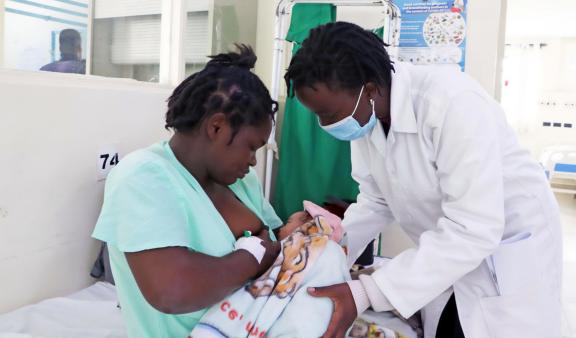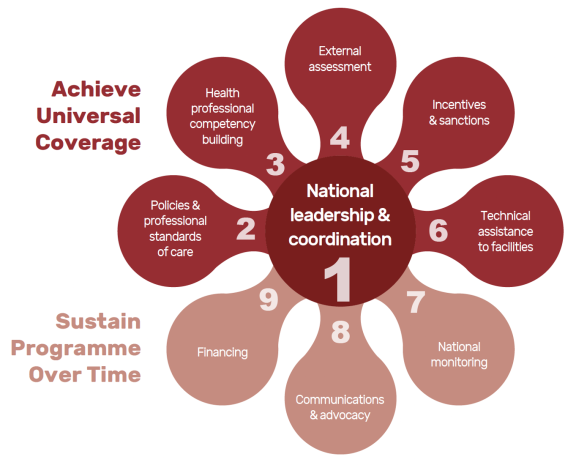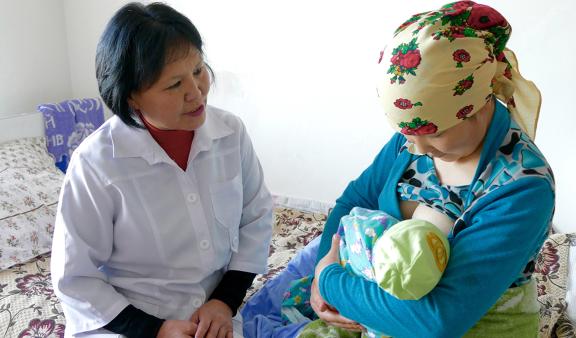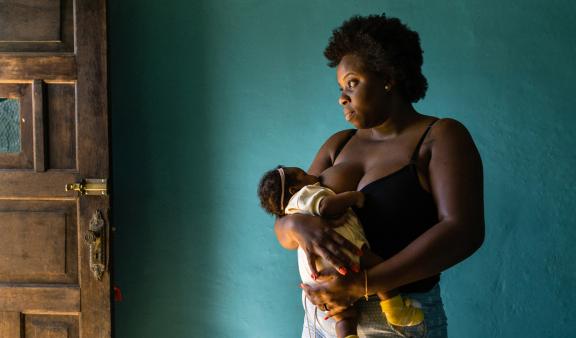Facilities providing maternity and newborn services are well placed to protect, promote, and support breastfeeding.
Studying and Supporting Efforts to Institutionalize the BFHI
Altrena Mukuria-Ashe, senior technical advisor with USAID Advancing Nutrition, describes how the project is supporting UNICEF and WHO’s dissemination of the updated guidance, and a recent case study on BFHI-related efforts in the Kyrgyz Republic and Malawi.
Read USAID Advancing Nutrition’s published case studies:
How to Support Breastfeeding in Different Contexts: Learning from the Kyrgyz Republic and Malawi
This two country case study describes how the Kyrgyz Republic implemented incentives and sanctions for breastfeeding support, and how the Republic of Malawi used technical assistance for national planning and to introduce quality improvement processes within hospitals.
Building the Competency of Health Professionals in the Kyrgyz Republic for the BHFI
This qualitative case study describes the Kyrgyz Republic's experience with health professional competency building related to breastfeeding counseling and support.

USAID Advancing Nutrition is sharing country experiences in expanding the coverage and sustainability of the BFHI.
USAID Advancing Nutrition is sharing country experiences in expanding the coverage and sustainability of the BFHI.
BFHI Through a Global Lens
Laurence Grummer-Strawn, a technical officer with the World Health Organization (WHO), describes the background of and recent updates that WHO and UNICEF made to the global BFHI.


Performance‐based financing is one way to incentivize quality improvement.
The use of performance‐based financing exists in many countries, including for maternity care services. However, there is a lack of documentation of its use in the postpartum period, which makes it difficult for countries to adopt this approach as evidence-based. Stakeholders from Brazil, Rwanda, Viet Nam, and the Krygyz Republic shared their experiences with incentives and sanctions for BFHI and related maternity and newborn care.
Performance‐based financing is one way to incentivize quality improvement.
The use of performance‐based financing exists in many countries, including for maternity care services. However, there is a lack of documentation of its use in the postpartum period, which makes it difficult for countries to adopt this approach as evidence-based. Stakeholders from Brazil, Rwanda, Viet Nam, and the Krygyz Republic shared their experiences with incentives and sanctions for BFHI and related maternity and newborn care.
Incentives and Sanctions: The Fifth of the Nine Key Responsibilities
Laurence Grummer-Strawn, a technical officer with the World Health Organization, explains why incentives and sanctions are an important component of the nine key responsibilities countries are called upon to fulfill through a national BFHI program.

Financial incentives for compliance with the Ten Steps.
A strong incentive involves linking financial payments for facilities offering maternity and newborn services to an external assessment process. This "performance-based financing" model of healthcare payment incentivizes quality and efficiency. Stakeholders from Brazil, Rwanda, and Viet Nam share their experiences implementing this model.
Financial incentives for compliance with the Ten Steps.
A strong incentive involves linking financial payments for facilities offering maternity and newborn services to an external assessment process. This "performance-based financing" model of healthcare payment incentivizes quality and efficiency. Stakeholders from Brazil, Rwanda, and Viet Nam share their experiences implementing this model.
Incentives for Accredited Baby-Friendly Hospitals in Brazil
Marina Ferreira Rea, member of the BFHI Global Coordinating Council, International Baby Food Action Network, describes financial incentives and sanctions being implemented in Brazil to support compliance with the Ten Steps at the national, regional, and health facility levels.
Performance-Based Financing for Maternal and Child Health in Rwanda
Professor Jeanine Condo, founder and CEO of the Center for Impact Innovation and Capacity Building and adjunct associate professor of Public Health at the University of Rwanda, describes a Rwandan model of support for maternal and child health services beyond breastfeeding counseling. She explains Rwanda’s efforts in some facilities to achieve universal coverage of quality services through the use of financial incentives for health workers.
Incentivizing Quality Breastfeeding Performance in Viet Nam
Binh Ta, regional technical specialist at Alive & Thrive Southeast Asia discusses how Viet Nam uses recognition, designation, and increased financial incentives for hospitals and health providers when they improve the quality of breastfeeding performance.

Monitoring Compliance with the Ten Steps.
Incentives and sanctions play a vital role in addressing compliance and non-compliance with the Ten Steps. The sustainability of the BFHI facility designation was dependent on advocacy, and hospital adherence tended to wane shortly after achieving the status. Countries need to establish internal monitoring systems that effectively respond to regular external assessments of adherence. Stakeholders from Viet Nam, the Kyrgyz Republic and Brazil talk about their experiences with monitoring.
Monitoring Compliance with the Ten Steps.
Incentives and sanctions play a vital role in addressing compliance and non-compliance with the Ten Steps. The sustainability of the BFHI facility designation was dependent on advocacy, and hospital adherence tended to wane shortly after achieving the status. Countries need to establish internal monitoring systems that effectively respond to regular external assessments of adherence. Stakeholders from Viet Nam, the Kyrgyz Republic and Brazil talk about their experiences with monitoring.
Incorporating a Breastfeeding Checklist for Public Recognition in the Kyrgyz Republic
Nazgul Abazbekova, the chief of party for USAID Advancing Nutrition Kyrgyz Republic discusses how the Kyrgyz Republic used performance-based financing by providing incentives to hospitals. She also explains how they integrated a breastfeeding checklist into the scorecard used by the mandatory health insurance fund.
Routine Assessments and Continually Raising Awareness of BFHI in Brazil
Marina Ferreira Rea, member of the BFHI Global Coordinating Council, International Baby Food Action Network, explains how Brazil conducts reassessments of Baby-Friendly hospitals every three years.
Performance- and Output-based Measures Used in Centers of Excellence in Viet Nam
Binh Ta, regional technical specialist at Alive & Thrive Southeast Asia discusses the Centers of Excellence for Breastfeeding in Viet Nam. Using annual self assessments, external assessments, and quarterly mother experience surveys, Viet Nam monitors the quality of breastfeeding support in hospitals.

Sustainability requires a holistic approach.
A holistic systems approach is needed to sustain BFHI—one that integrates the Ten Steps with other maternal and child health strategies, pre-service training for health professionals, and continually building on existing evidence. Rwanda, Brazil, and the Kyrgyz Republic discuss their efforts and their recommendations for sustainability.
Sustainability requires a holistic approach.
A holistic systems approach is needed to sustain BFHI—one that integrates the Ten Steps with other maternal and child health strategies, pre-service training for health professionals, and continually building on existing evidence. Rwanda, Brazil, and the Kyrgyz Republic discuss their efforts and their recommendations for sustainability.
Identifying Indicators for Performance-Based Financing in Rwanda
Professor Jeanine Condo, founder and CEO of the Center for Impact Innovation and Capacity Building and adjunct associate professor of Public Health at the University of Rwanda, describes how Rwanda ensures sustainability by pre-implementation planning using research institutions to identify costing and impact indicators prior to adopting performance-based financing and implementing a peer learning approach.
Advocacy for Sustainability and Scale-Up of BFHI in Brazil
Marina Ferreira Rea, member of the BFHI Global Coordinating Council, International Baby Food Action Network, describes how to facilitate sustainability, Brazil aims to establish an oversight committee, ensure materials are in the local language, advocate for the scale-up of Baby-Friendly practices to all maternity hospitals, and integrate the BFHI strategy into broader maternal and child health initiatives.
A Comprehensive Approach to Education for Sustaining BFHI in the Kyrgyz Republic
Nazgul Abazbekova, the chief of party for USAID Advancing Nutrition Kyrgyz Republic discusses how the Kyrgyz Republic aims to sustain BFHI by advocating for the education sector to institutionalize pre-service training and consistent in-service training, and for the health sector to ensure provider competency and address the needs of overworked providers.